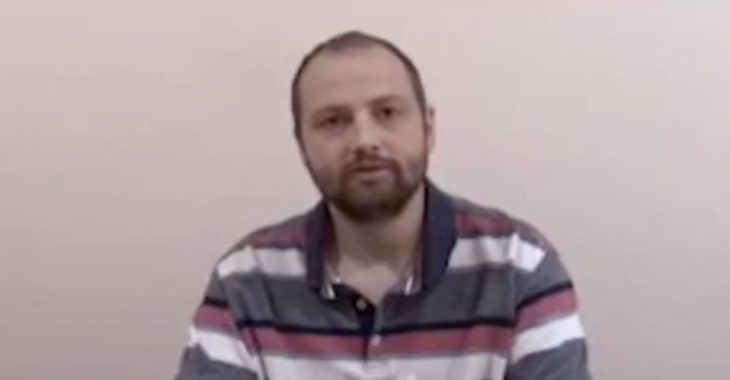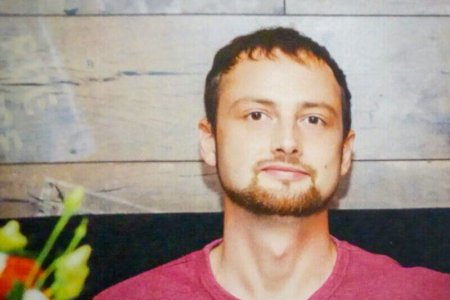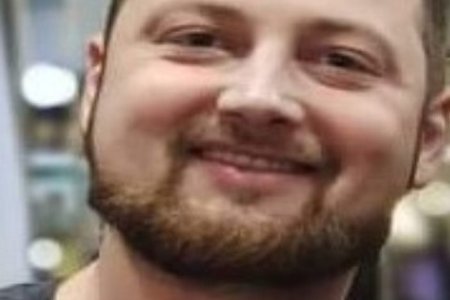
Two ‘witnesses’ have appeared at the ‘trial’ underway in Russia of Yaroslav Zhuk who was abducted by the Russian invaders in Melitopol in June 2022. Both individuals are collaborators, with Zhuk identifying the first of them as one of the men who beat and tortured him after his abduction. This was ignored by the ‘judges’ at the notorious Southern District Military Court in Rostov who have demonstrated since 2014 that, at least in cases involving Ukrainian political prisoners, they invariably work in close collaboration with the prosecution and provide the sentences demanded of them. The same court has paid no heed to the fact that Zhuk retracted his supposed ‘confession’ as soon as he was finally able to see an independent lawyer (Alexei Ladin) and that he has given a consistent, and harrowing, account of the torture used to extract his ‘confession’ for Russian propaganda.
Zhuk is one of a number of Ukrainians from occupied parts of Kherson or Zaporizhzhia oblasts whom Russia first illegally abducted and is now accusing of ‘acts of international terrorism’. This is under Article 361 of Russia’s criminal code which had not been used prior to Russia’s full-scale invasion of Ukraine and which Russia appears to be using to try to give some kind of cosmetic gloss to its internationally condemned invasion of Ukraine and seizure of civilians as hostages. The charges are in flagrant violation of international law, as are the methods used to obtain televised’ confessions. The latter, however, are not new, since Russia has been using torture, including beatings, mock executions and electric shocks, since it first invaded Ukraine in 2014.
Crimean Process has been following the ‘trial’ and reported on 9 October that the two prosecution witnesses were Yury Lysenko, a collaborator working for the occupation ‘police’ and Olena Shapurova, the Russian-installed 'director' of the Melitopol department of education’. Both individuals, having chosen to collaborate with the invading power, can expect to be the target of attacks, either by the Ukrainian Armed Forces or by partisans. While Russia’s FSB are notorious for claiming to have ‘thwarted’ fictitious acts of terrorism or sabotage, it is possible that there genuinely was an attempt on Shapurova’s life, but that is no ‘act of international terrorism’. The fact that the charges and alleged ‘evidence’ aim at proving this absurd indictment only exacerbates suspicion that Zhuk could have been targeted merely because he had never concealed his opposition to Russia’s invasion.
Lysenko’s ‘testimony’ also challenges credulity. He claimed that he was driving home when he heard an explosion and saw a car driving at great speed away from the event, ignoring a double yellow line. Lysenko, supposedly sped in pursuit, and “caught Zhuk” when the latter suddenly began obeying the road code and obligingly stopped at traffic lights. He claims that he stopped Zhuk, told him to get out and lie on the ground and that the latter did so. According to this implausible story, he (and, presumably, Zhuk, lying on the ground) then awaited the appearance of the Russian FSB, after which Lysenko disappeared.
The defence asked for earlier ‘testimony’ to be read out because of discrepancies, and also for permission to question Zhuk, as defendant, about Lysenko’s role in his torture. The court, as always, sided with the prosecution and released Lysenko from any further role in the ‘trial’.
Shapurova said that she had been about 10 metres away from the explosion, and that she had seen an orange car gain speed and flee the scene.
Zhuk is from Melitopol (Zaporizhzhia oblast) and was working as a volunteer when seized by the Russians on 17 June 2022. It was only after he was illegally taken to occupied Crimea that his whereabouts became known and he was able to smuggle out details of the torture he was subjected to. This was, in particular, to extract the ‘videoed confession’ a month after he was seized by the invaders and held incommunicado.
In a letter made public by the Crimean Human Rights Group, Zhuk explained that he had been seized on 17 June while driving in Melitopol. A BMW had blocked his path and an armed man, pointing a pistol at him, had dragged him out of his car, beating him, and then put handcuffs on, and a bag over his head. He was then taken by this armed man, and several others, to a basement where he was held for about a week. He is not certain how long he was there as he kept losing consciousness as a result of the torture he endured.
He was held all that time with a bag over his head, tied around with scotch tape. For the first three days, he was in handcuffs all the time, then they cut these off with an angle-grinder. Approximately every half-hour, his captors came and tortured him, applying wires to his legs; arms; genitals; earlobes or testicles, with the Russians then turning on an electric current, with this causing agonizing pain. He was also beaten with a blunt instrument over his entire body. They burned his feet with a lit gas burner , and also applied psychological torture. He was not given any food at all during the first week, only a tiny amount of water each day.
He wrote then that since the torture, he had lost the feeling in all toes, and had partially lost his hearing from the regular beatings around the head.
He eventually couldn’t endure such torture anymore and agreed to ‘confess’ to whatever they demanded of him. At that point he was taken, blindfolded, to another premises, without any light or water, where “they got me to sign a printed confession to fabricated charges.” He says that there were, in fact, three distinct versions of the ‘confession’, each of which he was tortured into signing. He was then forced to learn the text of (one) ‘confession’ and read it out before a video camera. They waited for this, however, until the torture marks on his face had cleared, with the claim about involvement in an attack against Shakurova shown and reported by state-controlled Russian media.
Zhuk asserts that they also forced him into holding (and therefore leaving fingerprints) on various items and substances. Such methods have long been used by the FSB in occupied Crimea, and several other hostages have also mentioned them.
Zhuk says that he was held in this basement from 17 June to 8 August, before being taken by force to occupied Crimea.
The next hearing in Zhuk’s ‘trial’ is scheduled for 25 October.



